Resilience Project
Due to limited options for secondary schooling in their remote home communities, over 500 Aboriginal and Torres Strait Islander Australian students are supported by the Queensland Department of Education Transition Support Service (TSS) to relocate and access their schooling in a boarding environment. For students to maintain their well-being, these transitions require navigation of new systems, cultures, challenges and resources, and the capacity of schools to support these processes. In response to increased suicide risk identified in Aboriginal and Torres Strait Islander youth, the five-year (2015-2020) Resilience Study was developed by CQUniversity and TSS to measure and develop strategies for building and maintaining resilience for students during this transition.
To do so, the study is investigating the impact of a multicomponent resilience intervention to enhance boarding schools' and transition support for Indigenous students and their levels of psychosocial resilience. We are testing the hypothesis that students' resilience is not positively influenced by the multicomponent intervention. The Resilience Study project has been funded by the National Health and Medical Research Council from December 2014. In 2017, the Resilience Study research team were awarded a Queensland Department of Education ‘Education Horizons Grant' to enhance the Resilience Study research and support the remaining phases of the study.
The Resilience Study is based on an integrated mixed methods approach; each component iteratively informing the other. The primary research methods are quantitative: 1) assessment of the effectiveness of the intervention in changing the levels of students' resilience, educational outcomes and suicide risk, and 2) economic evaluation of the intervention. The secondary methods are qualitative and include a grounded theoretical model of the process of enhancing psychosocial resilience to protect against suicide for Indigenous boarding school students.
A tertiary focus of the study is capacity development, whereby more experienced researchers in the team will provide research mentorship to less experienced researchers through regular meetings, and Indigenous team members will provide cultural mentorship in research practices to non-Indigenous members.
For more information please contact [email protected].
Student Artwork - Strong and Deadly by Venus Watson
This etching artwork is designed by Miss Venus Watson, a Year 12 student with a hearing disability from Palm Island. This artwork represents the strengths that she had and that she believes students need to exist, live, survive, be engaged and be happy at boarding school, away from kin and country.
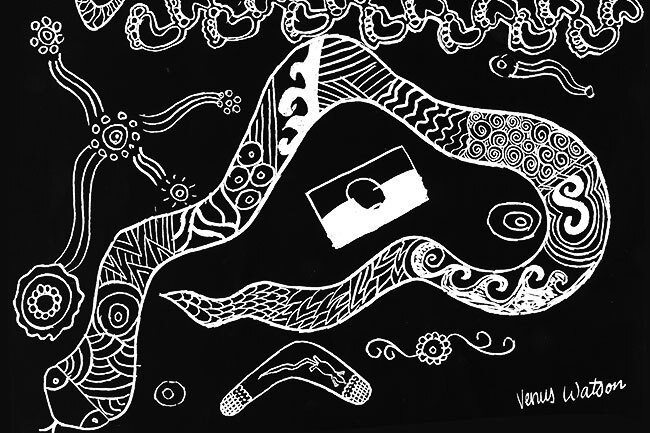
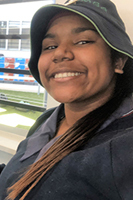
'Hello, my name is Venus Watson. I am also known as Venus Lawrence as this is the surname registered on my Birth Certificate. I come from Palm Island.
My artwork titled Strong and Deadly is scratch art and expresses resilience or the strengths I draw on to be strong and deadly at boarding school.
The Rainbow Serpent is my guardian spirit and creator with great powers and he is wrapped around the Aboriginal Flag which represents my pride and identity as a young Aboriginal woman. The footprints represent my life journey and on this journey, I carry with me my culture represented by the artefacts – boomerangs, totems – goanna, the flower and water symbols, all represent the importance of land and sea to me which comforts me and gives me hope for the future. Finally the connections I have with others and most importantly my family.
- Venus.'
Pilot Study
The Pilot Phase saw 94 students from three boarding schools and two remote community primary schools, along with re-engaging students from one remote community, participated in the Pilot Phase of the Resilience Study by completing student surveys, and the secondary students participated in student camps.
Pilot data found that most primary students reported high levels of resilience. A third of primary students reported normal - high levels of psychological well-being. Secondary students attending boarding school a reported reduction in resilience measures and psychosocial well-being.
The published paper Measuring resilience and risk factors for the psychosocial well-being of Aboriginal and Torres Strait Islander boarding school students: Pilot baseline study results offer more information about the background of the Resilience Study and the pilot survey data.
Phase One
In Phase One, 281 remote Cape York and Palm Island Indigenous students successfully completed the student survey. These students were from 18 boarding schools across Queensland, two remote community primary schools and re-engaging students from one remote community. STEP UP plans were developed by eight randomly-selected Phase One partner schools to promote the resilience of remote Indigenous students. Professional development sessions for schools and boarding facilities have been facilitated. Community meetings have also been held in five remote communities to feedback the Pilot Phase data to parents and community leaders.
Phase Two
The second phase of this study reports quantitative and qualitative data from students. An interrupted time series design is being applied to evaluate levels of change in students' resilience and well-being. Structured questionnaires were collaboratively developed, with questions adapted from the Child and Youth Resilience Measure (CYRM-28), and the Kessler Psychological Distress Scale (K5). Surveys were completed by 240 students from 17 boarding schools, 2 primary schools and re-engaging students from one remote community. As well, yarning circles were held, with students asked to discuss the ways they have maintained their well-being, despite the challenges of transitions.
Academic Publications
Resilience Study protocol
McCalman, J., Bainbridge, R., Russo, S., Rutherford, K., Tsey, K., Wenitong, M., Shakeshaft, A., Doran, C. & Jacups, S. (2016). Psycho-social resilience, vulnerability and suicide prevention: impact evaluation of a mentoring approach to modify suicide risk for remote Indigenous Australian students at boarding school. BMC Public Health, 16(1), 98. doi:10.1186/s12889-016-2762-1
Staff Capacity Development
Heyeres, M. McCalman, J., Bainbridge, R., Redman-McLaren, M. (2017). Staff capacity development initiatives that support the wellbeing of Indigenous adolescents in their transitions to boarding school: A systematic review. Frontiers in Education. DOI: 10.3389/feduc.2017.00001.
Heyeres, M., McCalman, J., Langham, E., Bainbridge, R., Redman-MacLaren, M., Britton, A., Rutherford, K., Tsey, K. (2018). Strengthening the capacity of education staff to support the wellbeing of Indigenous students in boarding schools: A participatory action research study. Australian Journal of Indigenous Education, 1-14. https://doi.org/10.1017/jie.2017.42
Survey development and validation
McCalman, J., Bainbridge, R., Redman-MacLaren, M., Russo, S., Rutherford, K., Hunter, E., & Wenitong, M. (2017). The development of a survey instrument to assess Aboriginal and Torres Strait Islander students' resilience and upstream risk factors for self-harm. Frontiers in Public Health. 2(19) doi: 10.3389/feduc.2017.00019.
Langham, E., McCalman, J., Redman-MacLaren, M., Hunter, E., Wenitong, M., Britton, A., Rutherford, K., Saunders, V., Ungar, M. & Bainbridge, R. (2018). Validation and Factor Analysis of the Child and Youth Resilience Measure for Indigenous Australian Boarding School Students. Frontiers in public health, 6, 299-299. doi:10.3389/fpubh.2018.00299
Resilience Survey Results
Redman-MacLaren, M. L., Klieve, H., Mccalman, J., Russo, S., Rutherford, K., Wenitong, M., & Bainbridge, R. G. (2017). Measuring Resilience and Risk Factors for the Psychosocial Well-being of Aboriginal and Torres Strait Islander Boarding School Students: Pilot Baseline Study Results. Frontiers in Education, 2, 1-10. doi:10.3389/feduc.2017.00005
Redman-MacLaren, M., Benveniste, T., McCalman, J., Rutherford, K., Britton, A., Langham, E., Stewart, R., Saunders, P., Kinchin, I. & Bainbridge, R. (2019). Through the eyes of students: the satisfaction of remote Indigenous boarding students' with a transition support service in Queensland, Australia. The Australian Journal of Indigenous Education, 1-12. doi:10.1017/jie.2019.3
Resilience Interventions in Schools
Jongen, C., McCalman, J., Bainbridge R (2020). A systematic scoping review of school-based resilience interventions for Indigenous adolescents in CANZUS nations. Frontiers in Public Health. 10 January 2020 https://doi.org/10.3389/fpubh.2019.00351
Jongen, C., McCalman, J., Bainbridge, R. (2019). Instruments to measure the resilience of Indigenous adolescents: A systematic scoping review of the literature. Frontiers in Public Health special resilience edition. 7:194 pp1-14. doi.10.3389/fpubh.2019.001
Benveniste, T., McCalman, J., Van Beek, A., Langham, E., Kinchin, I., Bainbridge, R. (2020). Can it be done? A process evaluation of the acceptability, feasibility and affordability of a school-based resilience intervention for Aboriginal and Torres Strait Islander youth. Australian and International Journal of Rural Education.
Health and Boarding Schools
McCalman J, Langham E, Benveniste T, Wenitong M, Rutherford K, Britton A, Stewart R, Bainbridge R. (2020). Integrating Healthcare Services for Indigenous Australian Students at Boarding Schools: A Mixed-Methods Sequential Explanatory Study. International Journal of Integrated Care, 20(1): 8, 1–16. DOI: https://doi.org/10.5334/ijic.4669
McCalman, J. Benveniste, T., Wenitong, M., Saunders, V., Hunter, E. (2020). “It's all about relationships”: the place of boarding schools in promoting and managing health and wellbeing of Aboriginal and Torres Strait Islander secondary school students, Children and Youth Services Review, doi: https://doi.org/10.1016/j.childyouth.2020.104954
Systems Approaches
Guenther, J., Benveniste, T., Redma n-MacLaren, M., Mander, D., McCalman, J., O'Bryan, M., Osborne, S., Stewart, R. (2020). Thinking with theory as a policy evaluation tool: The case of boarding schools for remote First Nations students. Evaluation Journal of Australasia, 20(1), 34–52. https://doi.org/10.1177/1035719X20905056
Lopez Carmen, V., McCalman, J., Benveniste, T., Askew, D., Spurling, G., Langham, E., Bainbridge, R. (2019). Working together to improve the mental health of Indigenous children: A systematic review. Children and Youth Services Review. Vol 104, September 2019, https://doi.org/10.1016/j.childyouth.2019.104408.94.
Resilience Study Schools and Community Meetings
13 and 14 August 2019
Once again the Resilience Study held its annual Schools & Communities Meeting in Cairns on the 13th and 14th of August, 2019. We were privileged to work with over 65 attendees including students, representatives from boarding schools and boarding facilities, and family and community representatives from Cape York and Palm Island. This meeting provided another opportunity for everyone to make and deepen connections, learn about communities (Laura, Coen, Aurukun, Pormpuraauw, Kowanyama, and Hope Vale) from their representatives, and to hear from students about who their mob are, what makes them deadly and who they get support from.
Throughout the two days, participants were fed back results from resilience study data, and then invited to participate in roundtable discussions about the implications of these findings. Facilitated by TSS representatives and guest facilitator from YETI, Helen Travers, community and school representatives worked through examples and collaboratively develop solutions to real-world experiences of boarding students. Meanwhile, student representatives worked with Semara Jose from DIYDG (Deadly Inspired Youth Doing Good), to better understand what culture means to them, and who and what supports them during their time at boarding school.
15 and 16 August 2018
The Resilience Study team is being led by Gungarri researcher, Professor Roxanne Bainbridge and Associate Professor Janya McCalman from CQUniversity, alongside Project Manager Dr Tessa Benveniste and the Transition Support Services (TSS) team which is led by State Program Manager, Mr Richard Stewart.
The published paper Measuring resilience and Risk Factors for the Psychosocial Well-being of Aboriginal and Torres Strait Islander Boarding school students: Pilot Baseline study results offer more information about the background of the Resilience Study and the pilot survey data.
This Resilience Study research team held the annual Resilience Study Schools and Community Meeting on 15 and 16 August 2018. We were privileged to work with students, representatives from boarding schools and facilities, community Mayors and representatives from Cape York and Palm Island, and TSS partner Primary schools – all in the one place! The attendance this year was outstanding, with around 90 participants!
The purpose of the meeting was to:
- Provide feedback on results of study to students, communities and schools,
- to contribute to improving the resilience of TSS supported students through linking their communities, schools and TSS,
- to work with the Participatory Action Research model to continuously improve and refine the research, and
- to begin collaboratively planning actions beyond the research. The insights and information that were generated together is valuable the resilience study, but most importantly, valuable for enhancing the support provided to remote Indigenous students in boarding schools.
Thank you to everyone who attended and thank you to our guest speakers, panel members, student leaders and to those who helped facilitate the breakout sessions. This year's meeting was a success thanks to you! For further information regarding the School & Community meetings please email project manager, Dr Tessa Benveniste: [email protected].
29 and 30 August 2017
The 2017 Schools and Community Meeting provided the opportunity for Boarding Schools, Community Leaders, school staff and students to get together to share about the Resilience Study and plan action for 2017 and beyond. Students shared their experience of being a boarder from a remote community, assisted in the facilitation of the workshop (in partnership with TSS and CQUni team) and advised as the team planned for Phase Two of the study. The meeting provided a unique opportunity for everyone to share their stories and provide directions for how we can all work together to create environments in which students can flourish and learn.
12 September 2016
The CQUniversity and Transition Support Services (TSS) Resilience Study team, led by Gungarri researcher A/Prof Roxanne Bainbridge and A/Prof Janya McCalman and working with TSS leadership Sandy Russo and Katrina Rutherford, facilitated a one day 2016 Schools and Community Meeting. This meeting provided an opportunity for Boarding Schools, Community Leaders, school staff and students to share about the Resilience Study Pilot Study and plan action for 2017.
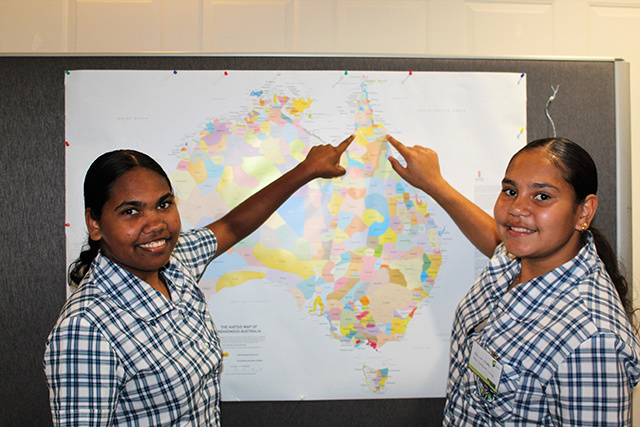
Keyonia Sinnamon & Alice-Lee Walker pointing to their home communities on the AIATSIS Indigenous Australia map (2019)
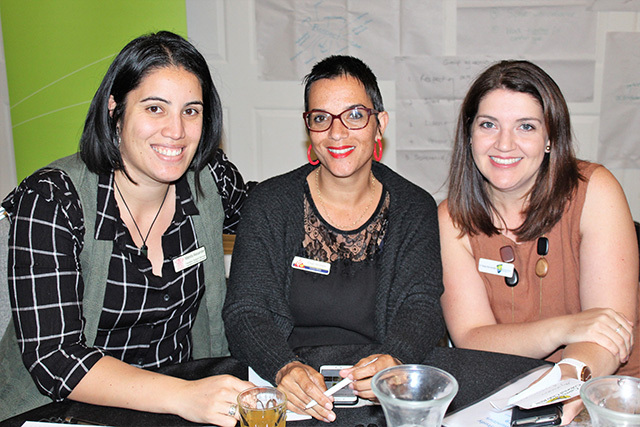
Mareta Alexander (TSS Toowoomba), Charada Grimes (Concordia Lutheran College) & Dr Tessa Benveniste (CQU) (2019)
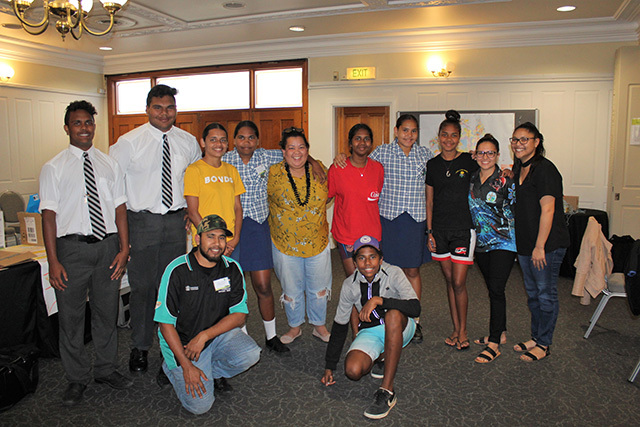
CQUni's Cassi-Ann Seden, DIYDG's Semara Jose & TSS mentors with students from boarding schools across QLD. (2019)
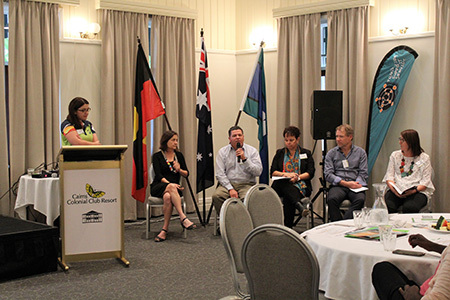
Guest Panel discussing how service providers can work together and support the resilience of students.
From left: Tessa Benveniste (CQUni), Cathy Adams (TSS), Peter Linehan (EQ), Antoinette Cole (Catholic Ed Cairns), Greg Franks (Boarding Australia), Janelle Knack (Catholic Ed Townsville) (2018).
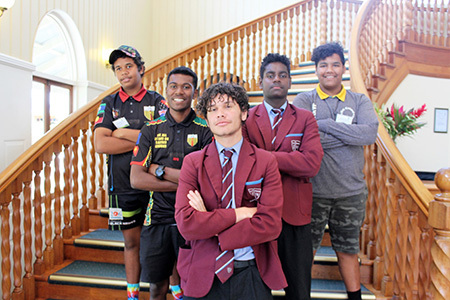
Names left to right: Taquiri Madua (Abergowrie), William Tamu (Abergowrie), Pryce Gibima (JPC), Nguumpii Rocky (JPC), Maurice Bourne (BTC) at the 2018 Schools and Community Meeting.
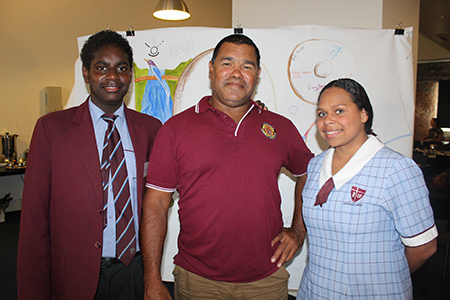
Nguumpii Rocky (John Paul College), Wayne Butcher (Mayor – Lockhart River) and Justine Omeenyo (John Paul College) standing in front of the artwork created by Vicki Saunders with the help of students (2017).
